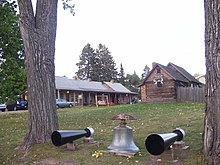William Whipple Warren

William Whipple Warren (born May 27, 1825 in La Pointe , Wisconsin , † June 1, 1853 St. Paul , Minnesota ) was an American historian and politician.
Live and act
Warren's mother was from the Anishinabe , also known as the Ojibwe. His father came from an old immigrant family who had reached America on the Mayflower in 1620 . He grew up in both cultures, spending part of his youth on the east coast and on Madeline Island, an island in Lake Superior . At that time the island was an important base in the fur trade between Indians and whites. Warren was the first writer to document the history of the Anishinabe Indians in writing. 1845 moved to what is now Minnesota, where he was elected to the House of Representatives for what was then the Minnesota Territory in 1850 . He died of tuberculosis at the age of only 27 and was buried in St. Paul. His book on the history of the Anishinabe Indians was not published until after his death. It is considered an important work in researching the history of the Indians before the arrival of the white settlers.
William Whipple Warren's mother was called Mary Cadotte. The Cadotte were a well-known family of fur traders and Madeline Island is named after his grandmother Madeline Cadotte. This in turn was a daughter of White Crane, a chief of the Anishinabe. His grandmother married Michel Cadotte (1764-1837) a fur trader with a French father and a mother from the Anishinabe tribe. His father's family, Lyman Marcus Warren, came from New England and were descendants of Richard Warren, one of the first English settlers to emigrate to America on the Mayflower in 1620. He was also a fur trader.
The Anishinabe had a system of patrilinearity , the transmission and inheritance of social characteristics and property as well as the family name went exclusively through the male line from fathers to sons. Because of this, William Whipple Warren was never recognized as a full member of the tribe because his father was not a member of the tribe, but a white man. Mixed race people were often discriminated against in white American society. So Warren was not fully recognized by either side.
William Whipple Warren attended Evangelical Mission Schools on Madeline and Mackinac Island before moving to Clarkson, New York with his grandfather Lyman Warren at the age of 11 . There he attended the 'Clarkson Academy' and then the 'Oneida Institute' in Whitesboro, New York, a school of the Presbyterian Church . The Oneida Institute was a special facility for the education of Native Americans. In 1840 the 15-year-old returned to his family in Madeline Island.
At the age of 17 he began to ask his family members and other tribal members about the stories and traditions of the Anishinabe, which had previously only been passed on orally from one generation to the next. He was a good listener and tried to document these stories in a scientifically correct manner. Since Warren grew up bilingual, he moved to Crow Wing, Minnesota, as an interpreter with the American trader Henry Mower Rice in 1845 . Here, too, he questioned the Anishinabe who lived there and wrote down their stories. He worked with Henry Rowe Schoolcraft , an American explorer and ethnologist best known for finding the source of the Mississippi River in 1832 . Schoolcraft was a former Indian agent for the Bureau of Indian Affairs , collected information and researched on behalf of the American Congress. He encouraged Warren to publish his writings. Warren began writing for the Minnesota Pioneer in 1849 . Encouraged by the positive response to his series of articles, he began writing a new series, A Brief History of the Ojibwas, for the Minnesota Democrat newspaper. In 1851 Warren was elected to the Minnesota Territory House of Representatives. After a few months, he and seven others resigned in protest against a new seat allocation plan . He claimed that the census on which the distribution of seats was based was incorrect. In the subsequent election he lost the election to James Beatty. In vain he challenged his defeat. His employer Henry Rice was later elected to the US Senate (1858–1863).
Warren was married to Mathilda Aitken, daughter of Gin-gion-cumig-oke, an Anishinabe, and William Alexander Aitken, a fur trader. He had five children. He died of tuberculosis at the age of 27 and was buried in St. Paul. His book History of the Ojibway People, Based Upon Traditions and Oral Statements was not published until 30 years after his death.
Web links
- History Of The Ojibways, Based Upon Traditions And Oral by William W. Warren (English)
- The Autoethnography of William Whipple Warren (English)
Individual evidence
| personal data | |
|---|---|
| SURNAME | Warren, William Whipple |
| BRIEF DESCRIPTION | American historian and politician |
| DATE OF BIRTH | May 27, 1825 |
| PLACE OF BIRTH | La Pointe, Wisconsin |
| DATE OF DEATH | June 1, 1853 |
| Place of death | St. Paul , Minnesota , United States |

